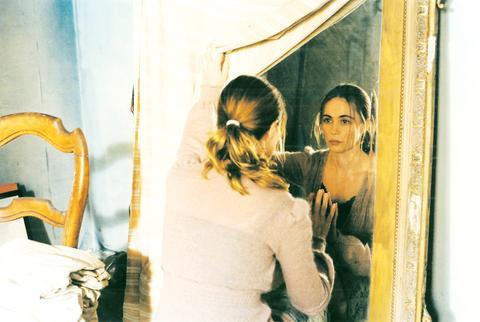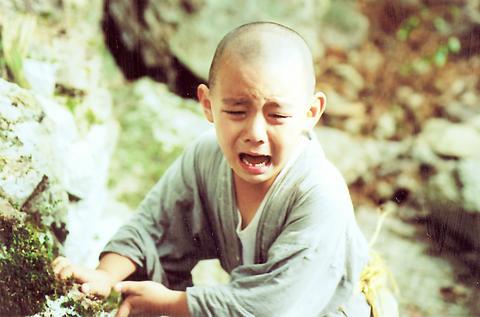Starting this Sunday, movie fans are in for a Spanish treat. Organizers of the Taipei Film Festival (
In addition to 50 Spanish films, there will be 50 Chinese-language and Asian films shown at the festival's three venues, which are at Zhongshan Hall (

Including the famed Pedro Almodovar and surrealist master Luis Bunuel, there will be 10 important Spanish directors introduced in the programs.

First off, Luis Bunuel, the original Spanish filmmaking master, will have two of his films showcased at the festival. Viridiana is a film about a novice nun being fooled by the beggars she shows charity to. The film was banned in Spain on the grounds of blasphemy, though it won the Palme d'Or at the Cannes Film Festival. Tristana is an Oscar-nominated film starring Catherine Deneuve which is an allegorical story about a beautiful girl exploited and seduced by her benefactor.
Pedro Almodovar is well-known for his expressiveness with color, for the photographic quality of his films and, of course, his celebration of love and desire (albeit in some bizarre forms).

TFF has selected six of Almodovar's earlier works and these show more of his daring talents than his later commercial works do. These early works include Pepi, Luci, Bom, about rape, revenge, lesbianism and S/M; Matador, about the relationship between love, desire and murder; and Women On the Verge of Nervous Breakdown, about three women driven mad by their absent boyfriends.

Almodovar could not make the trip to Taipei as he is working on his new film, but he donated his personal collection of out-of-print posters for two of his films, Laws of Desire and Women On the Verge of Nervous Breakdown.
Apart from these two filmmakers, the festival will feature a work by Carlos Saura, the filmmaking master who combines flamenco dance with surrealist cinematography. Saura's 2002 work Salome has been selected as the opening film for TFF.

For fans of Victor Erice, the filmmaker who comes out with a masterpiece every 10 years, they will get to see three of his works from the 1970s to 1990s: The Spirit of the Beehive, The South and Quince Tree of the Sun.

For movie-goers who might wish to see what a propaganda movie written by the dictator General Francisco Franco is like, TFF organizers have dug up the 1942 film Race.
For younger filmgoers, there is the romantic love story The Lovers of the Arctic Circle, by director Julio Medem. There is also the debut film Thesis from Alejandro Amenabar (director of Open Your Eyes, The Others). The film is a thriller about young women studying violent movies.

Also, there's the winner of the 2003 Goya Awards (Spain's answer to the Oscars), Mondays in the Sun, a story about a day in the life of a group of unemployed men in an industrial city of Northern Spain. It is a film, pregnant with humor and thoughtful asides, made by the 34-year-old Fernando Leon de Aranoa.

If the Spanish movies are not to your taste, then TFF is also presenting Chinese dishes, such as the Taiwanese film Formula 17, a gay romantic comedy which is the opening film for the screening segment dubbed "New Age of Independents: Global Chinese Films." In this section, there are seven independent or underground Chinese films. The big gap in wealth between the city and the country, and lost young people struggling for identity and a better life are the two main themes for these films.
Chen Mo and Meiting (

South Korea's Kim Ki-duk is showing two films: The Coast Guard and Spring, Summer, Fall, Winter ... and Spring. The former is about a soldier in the demilitar-ized zone who mistakenly shoots a drunken civilian having sex with his lover. He is thus traumatized and haunted by the image of the killing. The latter film is Kim's recent highly praised work, which strays from his usual theme of violence and instead presents a more tender picture of existence. The film describes a monk's life, how he breaks the rules (submits to the temptation of desire) and later commits murder. Each episode expresses a zen-like feeling yet Kim still maintains a strong visual charm, telling a quiet, yet visually exciting story.

What: Taipei Film Festival
When: March 21 to April 3
Where: Zhongshan Hall, 98 Yenping S Rd, Taipei (¥x¥_¥«©µ¥«n¸ô98¸¹)
Metropolitan Hall, 25 Bade Rd, Sec 3, Taipei (¥x¥_¥«¤K¼w¸ô¤T¬q25¸¹)
President Cinema, 4F, 59 Zhonghua Rd, Sec 2, Taipei (¥x¥_¥«¤¤µØ¸ô¤G¬q59¸¹4¼Ó)
How much: Tickets are NT$150 if purchased by March 21, NT$180 during the festival period, from Acer ticketing outlets.
More information about the program is available at Eslite Bookstore, or go to www. tiff.org.tw

That US assistance was a model for Taiwan’s spectacular development success was early recognized by policymakers and analysts. In a report to the US Congress for the fiscal year 1962, former President John F. Kennedy noted Taiwan’s “rapid economic growth,” was “producing a substantial net gain in living.” Kennedy had a stake in Taiwan’s achievements and the US’ official development assistance (ODA) in general: In September 1961, his entreaty to make the 1960s a “decade of development,” and an accompanying proposal for dedicated legislation to this end, had been formalized by congressional passage of the Foreign Assistance Act. Two

Despite the intense sunshine, we were hardly breaking a sweat as we cruised along the flat, dedicated bike lane, well protected from the heat by a canopy of trees. The electric assist on the bikes likely made a difference, too. Far removed from the bustle and noise of the Taichung traffic, we admired the serene rural scenery, making our way over rivers, alongside rice paddies and through pear orchards. Our route for the day covered two bike paths that connect in Fengyuan District (豐原) and are best done together. The Hou-Feng Bike Path (后豐鐵馬道) runs southward from Houli District (后里) while the

March 31 to April 6 On May 13, 1950, National Taiwan University Hospital otolaryngologist Su You-peng (蘇友鵬) was summoned to the director’s office. He thought someone had complained about him practicing the violin at night, but when he entered the room, he knew something was terribly wrong. He saw several burly men who appeared to be government secret agents, and three other resident doctors: internist Hsu Chiang (許強), dermatologist Hu Pao-chen (胡寶珍) and ophthalmologist Hu Hsin-lin (胡鑫麟). They were handcuffed, herded onto two jeeps and taken to the Secrecy Bureau (保密局) for questioning. Su was still in his doctor’s robes at

Mirror mirror on the wall, what’s the fairest Disney live-action remake of them all? Wait, mirror. Hold on a second. Maybe choosing from the likes of Alice in Wonderland (2010), Mulan (2020) and The Lion King (2019) isn’t such a good idea. Mirror, on second thought, what’s on Netflix? Even the most devoted fans would have to acknowledge that these have not been the most illustrious illustrations of Disney magic. At their best (Pete’s Dragon? Cinderella?) they breathe life into old classics that could use a little updating. At their worst, well, blue Will Smith. Given the rapacious rate of remakes in modern